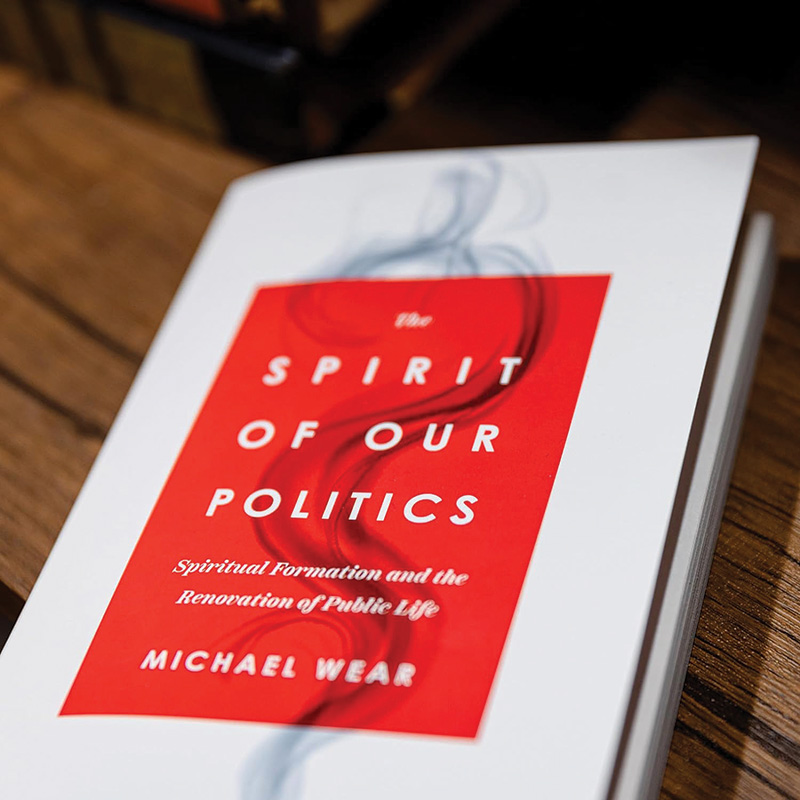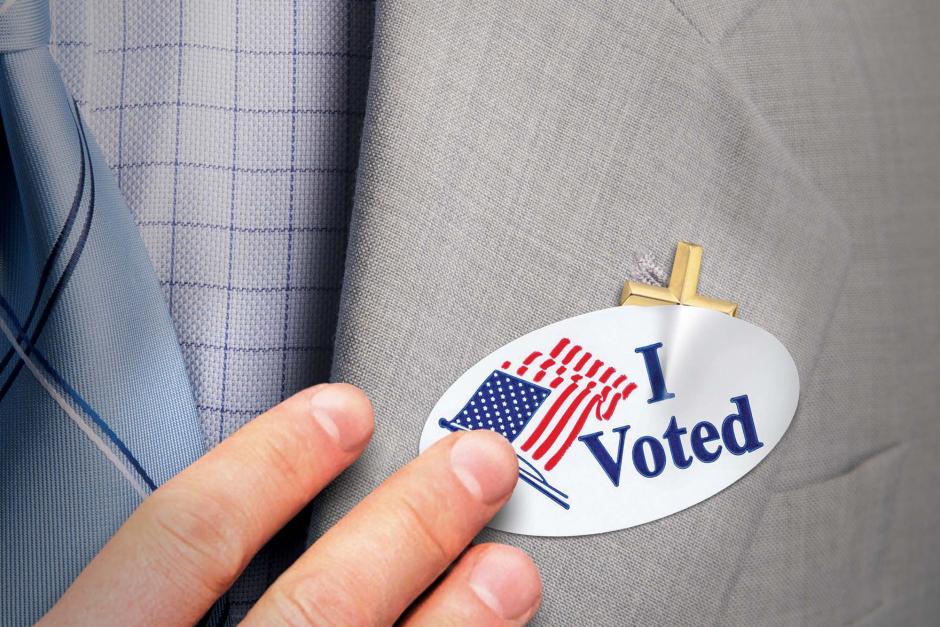Flipping the Script on Faith and Politics
Michael Wear March/April 2024On what ground should the Christian stand in public life when Christianity is so often invoked for unchristian ends? In a time in which everything seems contestable, and the sacred so quickly turns profane, how should Christians approach politics?
From criticism of “Christian nationalism” to concerns about a “secular surge,” there is great angst among the general public, and among Christians themselves, over the proper relationship between faith and politics. According to Pew Research, Americans are divided on the question: some 42 percent believe religion has too much influence in politics; 25 percent believe it does not have enough. Four in 10 Americans believe religion is declining in America and that that is a negative development, while a quarter of Americans “express a negative view of religion by saying either that religion’s influence is waning and that is a good thing, or that religion’s influence is growing and that is a bad thing.”1 Headlines and political campaigns warn of growing or declining religious influence in politics.2 Our political system fuels, and is fueled by, this angst. What are its sources?
First, we must acknowledge that this angst derives from disagreement driven by the political goals of various religious constituencies. If there was broad agreement on the nature of our politics and various policy outcomes, or if we did not live in a country where citizens are empowered to shape political outcomes, the political views of religious people would have less of a public impact. Instead, the political views of religious citizens do matter in our politics, because in our form of government citizens have political influence, however limited.
The vast majority of popular angst about Christianity and politics is motivated by disagreements or opposition to particular causes or policies. That is to say, the angst is narrowly political in nature, not theological. It is driven by common perceptions about the political objectives of Christians—fears, for instance, that Christians seek to use politics to aggrandize themselves and others like them.
Second, there are profound misunderstandings among the public—stoked by some politicians and advocacy groups—regarding laws surrounding the intersection of religion and politics. Hanging over our politics is the misconception, which former President Barack Obama called a “practical absurdity,” that religious ideas are not even permissible in our politics. There are the bright-red legal lines, of course, that mark what we refer to as the “separation of church and state.” But there are also the myriad ways in which the philosophical or imaginative power of this idea of separation of church and state haunts our politics and shapes how millions of Americans think about political engagement in the context of their own lives and beliefs.
Third, Christian political engagement has largely moved from a basis in moral knowledge to the goal of gaining power. Christian political engagement has become explicitly framed in some Christian circles as a matter of imposition rather than contribution. For some Christians, political strategy—rather than the public good—has become the dominant narrative frame.
To summarize, then, the growing angst about the role of religion in America’s public life derives from views that religious influence in politics is harmful, improper, and irrelevant. It is an angst that reflects more than just legal or constitutional concerns; it is also driven by a vague sense of violation, of category confusion, of discomfort.
This angst is not held solely among those who are not Christian, but is often shared by Christians themselves. At the heart of this angst is not so much a concern regarding religious influence, but one of improper religious imposition. This angst is compounded by the fracturing of any common civic conversation, and the toxic polarization that heightens the personal antipathy felt and expressed in our politics.
Forging a New Narrative
Whatever its political utility, a response to this angst that simply seeks to “rule out” religious contributions that are deemed negative—rather than contesting those contributions on their merits—will ultimately be ineffective. Such a response will undermine confidence in the democratic process and increase religious and political division. Instead, in order to reduce the angst over the proper relationship between faith and politics, Christians themselves must approach politics in a different way, with a different spirit.
Christians must take responsibility for their participation in political life as an aspect of their life with Jesus. The idea that we can separate our faith from our politics is a nonsensical idea that brings with it assumptions and impositions on religion itself. The question is not whether it is “possible” to separate out one’s faith from one’s politics; the question itself positions faith as subservient to politics. Some mistakenly believe that a pluralistic society requires, and will be supported by, the subjugation of religious commitments to political commitments. However, a politics that has its way with religion can be at least as dangerous as religion having its way with politics. While clarifying and adjusting church-state legal boundaries might be needed, this kind of policy and legal work will not resolve angst about faith and politics. Procedure and technique will get us only so far.
I do not mean to disparage attempts to strengthen religious freedom and strengthen constitutional protections around religious influence in politics. I have been involved in religious freedom advocacy and policy for more than a decade, and I believe it is absolutely vital work. Yet I am reminded of T. S. Eliot’s observation that we so often consider our job to be that of finding a system of order so perfect that we will not have to be good.
I am grateful for guardrails and guideposts in our laws, but those are no match for people who do not seek to be, and advance, good. We see this in the strategies of government officials who, with such careful, methodical attention, seek to evade religious freedom laws by ensuring that their animus toward religion cannot be found in the public record. We find it also in those who are unwilling to sacrifice their political ambitions for the sake of telling the truth (about the 2020 election, for instance) and instead indulge in lies in pursuit of personal gain and political aims, in disregard of their conscience.

Reordering the Political and Spiritual
One of the first things Christians will see clearly once they take responsibility for their politics is the nature of politics itself: that it is both penultimate and prudential. Penultimate, in that it will always be secondary to spiritual concerns. Prudential, because politics is almost never about implementing indisputable principles, but instead about choosing between imperfect policies and goals.
“A sick society must think much about politics, as a sick man must think much about his digestion,” C. S. Lewis wrote. However, “if either comes to regard it as the natural food of the mind—if either forgets that we think of such things only in order to be able to think of something else—then what was undertaken for the sake of health has become itself a new and deadly disease.” That disease has symptoms, such as forsaking faithfulness for political advantage, and mistaking one’s political opinions for religious dogma. Instead, Christians should embrace, and offer to the public, the gift of knowledge regarding the proper role of politics and the humility with which political opinions should be held.
Once we understand the nature of our politics, we can then consider how Christians ought to orient their politics. Christians’ politics should be directed toward the good of our neighbors, as best as we can see it, in consultation with Scripture, Christian tradition, fellow Christians, and our neighbors themselves. Thus, we will take politics seriously, but also recognize we are part of a body politic and see voting for what it is. We will understand that in all but the rarest of circumstances—and we should be hesitant to suggest in an unequivocal manner what the exceptions are—there is no single wholistic Christian policy platform. Instead, we will want to participate in politics with faithfulness in mind and with prayer that intends to expose our heart to God and to ourselves. And as we engage, we will carry a moral burden that is rightly sized and rightly situated. Because politics is penultimate and prudential, we will be unwilling to pressure others to worship our political views. Our faith is our motivation in politics; it is not our mandate.
Faith’s Gift to Politics
Politics is an essential forum in which we live out our love for God and neighbor. Because politics is penultimate, not ultimate, we do not seek political ends at the cost of faithfulness. Instead, we seek to be faithful in politics. And because politics is prudential, we understand that it would be a form of blasphemy to flippantly ascribe to our preferred policy instruments and political judgments the weight of religious dogma. Our aim is to build, not a political uniformity among Christians, but rather a spiritual integrity.
It is insufficient, though it would be a good start, to simply “live this out,” and hope that others will understand what distinguishes this kind of religious motivation in politics from other religious motivations. Our broader civic life would greatly benefit from Christians who can articulate a clear vision of politics as penultimate and prudential.
While there are historical and other reasons to be concerned about the ways in which religion can promote political conflict, we should know by now that people don’t need religion to make dogma of their politics and to harm others in the name of that dogma. A healthier Christian approach to politics would benefit the whole of our civic life.
Some dream that religion will simply fade out of relevance in our politics. Others dream that their pseudo-religious politics alone will dictate our nation’s future. Both dreams are antisocial and counterproductive. If we are to address the current angst regarding faith in this political moment, and in our political future, we must embrace the possibility that faith might be a gift to our politics, and work to make that vision real.
1 Pew Research Center, “45% of Americans Say U.S. Should Be a ‘Christian Nation’ ” (October 2022).
2 For instance, Joseph A. Wulfsohn, “James Carville: ‘Christian Nationalists’ Like Speaker Mike Johnson Are a ‘Bigger Threat Than al-Qaeda,’ ” Foxnews.com (December 2, 2023); Libby Cathey, “Weaponizing Religion: Trump’s Attacks on Biden’s Faith, Calling Him ‘Against God,’ ” ABCnews.go.com (August 12, 2020).
Article Author: Michael Wear
Michael Wear is the founder, president, and CEO of the Center for Christianity and Public Life (www.ccpubliclife.org). He is the author of the book The Spirit of Our Politics: Spiritual Formation and the Renovation of Public Life, which was released in January 2024.
